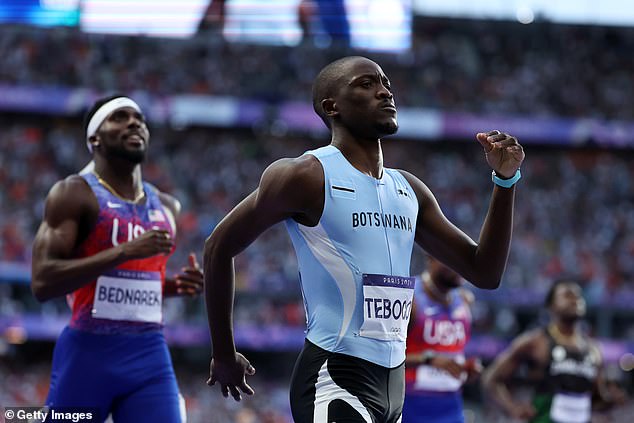Red-hot favorite Noah Lyles finishes THIRD in Olympics 200m final as Botswana’s Letsile Tebogo shocks the world to take gold in Paris
Noah Lyles just missed out on a historic sprint double at the Paris Olympics, finishing third in the 200 meters behind Botswana’s Letsile Tebogo. Lyles’ American teammate Kenny Bednarek won his second consecutive silver medal, while Lyles took home his second career bronze medal in the event.
The disappointment soon gave way to a terrifying scene when Lyles was carted off the track by medics after his third place.
After winning the 100-meter final in a historic photo finish earlier in the week, Lyles was plagued by a slow start on Thursday. Ultimately, he was unable to catch Bednarek, who led from start to finish and won in 19.46 seconds. Bednarek finished in 19.62 and Lyles ran the curve in 19.70
Lyles now has two bronze medals in the 200 meters, including his third-place finish at the 2020 Tokyo Games.
Team United States bronze medalist Noah Lyles competes in the men’s 200 meters final

Team Botswana’s Letsile Tebogo celebrates winning the gold medal in the 200m final
Winning gold in the 100 and 200 meters at a single Olympics is a rare feat. Usain Bolt achieved the double at three consecutive Olympics — Beijing in 2008, London in 2012 and Rio de Janeiro in 2016. But until the Jamaican, no man had done it since Carl Lewis in Los Angeles in 1984.
At his last Games, eight years ago, Bolt was finishing in his 200 semifinal when he suddenly realized that André De Grasse was running fast. So Bolt turned up the speed and pointed his finger at the Canadian. Fast-forward to the final: Bolt won easily.
Lyles previously won the 100m final in a historic photo finish.
The American showman defeated Jamaica’s Kishane Thompson on Sunday by five thousandths of a second, or 0.005 seconds, in a race for the ages.
The final score in this race: Lyles 9.784 seconds, Thompson 9.789.
The new champion said that one of his physiotherapists had assured him before he left for Paris that this race would be a narrow victory.
“He said, ‘This is how close the first and second are going to be,'” Lyles said, pinching his thumb and index finger together so they were almost touching. “I can’t believe how right he was.”
To put it into perspective, the blink of an eye lasts an average of 0.1 seconds, which was 20 times longer than the gap between the first and second.
It was a close call, when the sprinters crossed the finish line and the word “Photo” appeared next to the names of Lyles, Thompson and five others in the eight-man field, Lyles walked over to the Jamaican and said, “I think you have the Olympic dog.”
Thompson, who was three lanes to the left of Lyles and had no idea where he was on the track, was not convinced.
“I thought, ‘Wow, I’m not even sure because it was close,’” the Jamaican said.
Only time would tell. It always does. When Lyles’ name came up first, he ripped his name tag from the front of his bib and held it up. Moments later, he shouted at the TV camera, “America, I told you I could do this!”
The top four racers were separated by less than 0.03. The top seven all finished within 0.09 of each other.
American Fred Kerley came in third with a time of 9.81. “That’s probably one of the nicest races I’ve ever done,” he said.
In the photo finish, Kerley’s orange shoe crossed the finish line before anyone else, or anything. But it’s the chest that breaks the barrier that counts. Lyles’ chest crossed first.
This was the narrowest 1-2 finish in the 100 meters since Moscow in 1980 — or perhaps ever.
